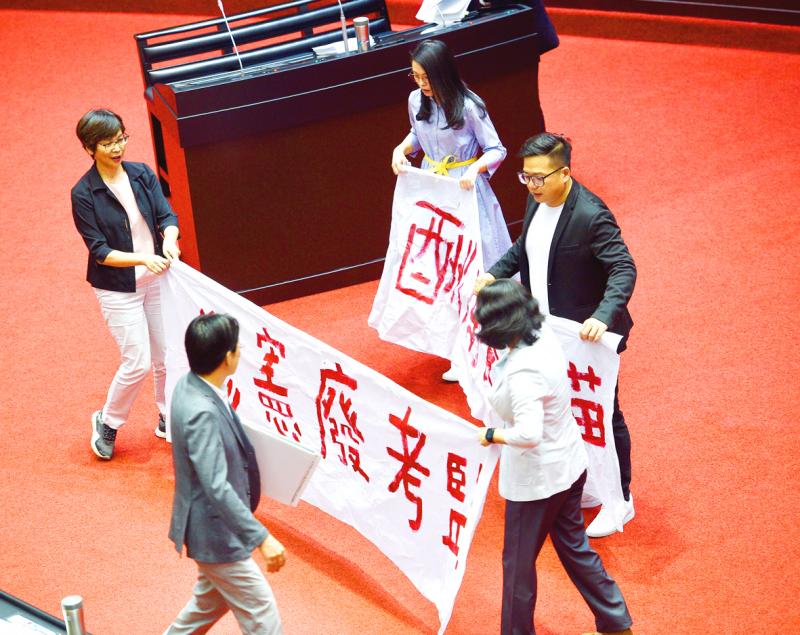The Control Yuan and Examination Yuan should be abolished as their seats are filled with “fat-cat patronage appointments” for well-paying and cushy jobs, while some members have accepted teaching positions in China, raising national security concerns, Taiwan People’s Party (TPP) and New Power Party (NPP) lawmakers said yesterday.
Prevailing public opinion is that it is time that both branches of government be abolished, the TPP’s five lawmakers said.
The life-long goal of many people in Taiwan’s academic circles is to be appointed to the Examination Yuan, “because it is such a cushy job without much to do, and by law members enjoy a very high salary commensurate with the head of a government ministry,” TPP Legislator Jang Chyi-lu (張其祿) said.

Photo: Peter Lo, Taipei Times
The current extraordinary legislative session is reviewing the nominations for 11 seats on the Examination Yuan, in charge of administering civil service examinations, and for 27 seats on the Control Yuan, the government’s watchdog body.
The TPP held a brief protest inside and outside the main legislative chamber, during which TPP caucus whip Lai Hsiang-ling (賴香伶) raised the issue of some Examination Yuan members accepting outside work, including lecturing posts in China.
“Many people are disgusted by the fact that Examination Yuan members earn outside income, even though their annual salary is NT$2.7 million [US$91,198], and if promoted to the board of examiners, members receive an extra NT$700,000 on top of their salaries,” Lai said.
“Some Examination Yuan members have accepted visiting professor or guest lecturer posts at universities in China. They are also known to receive other extra income from taking on other part-time academic work,” Lai said. “This is why most people see the seats as ‘fat-cat patronage appointments’ by which the ruling party can reward its friends.”
NPP Legislator Claire Wang (王婉諭) said that her party’s stance was very clear: both Control Yuan and the Examination Yuan should be abolished.
“However, before that can be done, we will scrutinize the nomination process very carefully, to see if the nominees are qualified,” she said.
NPP lawmakers said they were angry that none of the nominees had responded to the party’s questionnaire about specific cases involving the Examination Yuan’s authority.Those who had not responded included Examination Yuan president nominee Huang Jong-tsun (黃榮村) and vice president nominee Chou Hung-hsien (周弘憲).
Their refusals were outrageous, NPP caucus whip Chiu Hsien-chih (邱顯智) said.
“We had sent out the questionnaire a month ago, and it only had seven questions, the most important of which was the nominees’ opinion on discovering people taking a civil service exam had cheated,” Chiu said.
“The questionnaire is not so tough... Our society has many impoverished people, but Examination Yuan members enjoy very high salaries and good perks, all paid for by the taxpayers. By not responding to the questionnaire, they are showing their disregard of the taxpayers who are pay their salary,” Chiu said.

The first two F-16V Bock 70 jets purchased from the US are expected to arrive in Taiwan around Double Ten National Day, which is on Oct. 10, a military source said yesterday. Of the 66 F-16V Block 70 jets purchased from the US, the first completed production in March, the source said, adding that since then three jets have been produced per month. Although there were reports of engine defects, the issue has been resolved, they said. After the jets arrive in Taiwan, they must first pass testing by the air force before they would officially become Taiwan’s property, they said. The air force

The Coast Guard Administration (CGA) yesterday said it had deployed patrol vessels to expel a China Coast Guard ship and a Chinese fishing boat near Pratas Island (Dongsha Island, 東沙群島) in the South China Sea. The China Coast Guard vessel was 28 nautical miles (52km) northeast of Pratas at 6:15am on Thursday, approaching the island’s restricted waters, which extend 24 nautical miles from its shoreline, the CGA’s Dongsha-Nansha Branch said in a statement. The Tainan, a 2,000-tonne cutter, was deployed by the CGA to shadow the Chinese ship, which left the area at 2:39pm on Friday, the statement said. At 6:31pm on Friday,

The Chinese People’s Liberation Army Navy’s (PLAN) third aircraft carrier, the Fujian, would pose a steep challenge to Taiwan’s ability to defend itself against a full-scale invasion, a defense expert said yesterday. Institute of National Defense and Security Research analyst Chieh Chung (揭仲) made the comment hours after the PLAN confirmed the carrier recently passed through the Taiwan Strait to conduct “scientific research tests and training missions” in the South China Sea. China has two carriers in operation — the Liaoning and the Shandong — with the Fujian undergoing sea trials. Although the PLAN needs time to train the Fujian’s air wing and

STRIKE: Some travel agencies in Taiwan said that they were aware of the situation in South Korea, and that group tours to the country were proceeding as planned A planned strike by airport personnel in South Korea has not affected group tours to the country from Taiwan, travel agencies said yesterday. They added that they were closely monitoring the situation. Personnel at 15 airports, including Seoul’s Incheon and Gimpo airports, are to go on strike. They announced at a news conference on Tuesday that the strike would begin on Friday next week and continue until the Mid-Autumn Festival next month. Some travel agencies in Taiwan, including Cola Tour, Lion Travel, SET Tour and ezTravel, said that they were aware of the situation in South Korea, and that group